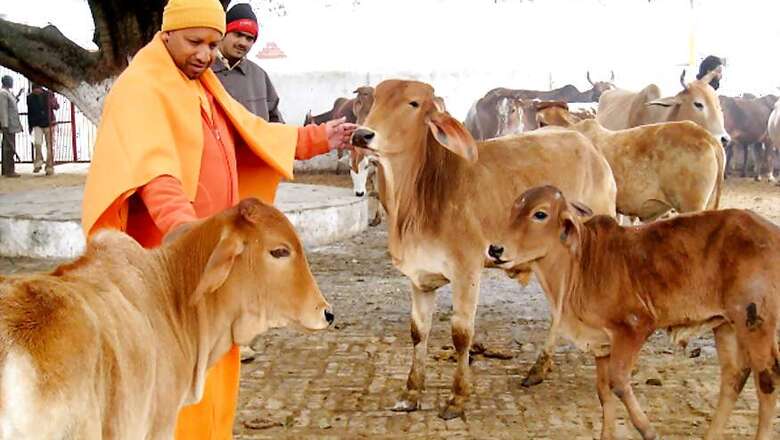
views
A clear Political and ideological foresight in policy implementation: that's the precise narrative of UP Chief Minister Yogi Adityanath and his government as it completes one month in office.
From a stringent action against the illegal slaughterhouses to the formation of anti-Romeo squads; vociferous criticism of triple talaq and a loan waiver of Rs 30 thousand crore to farmers, every decision of the Yogi government is driven by political calculations.
After a landslide victory in UP election, choice of Yogi Adityanath, the Hindutva hardliner MP from Gorakhpur, had surprised many. It was seen as BJP's intention to depart from covert Hindutva agenda to clear hard-line politics. In Yogi's persona, going by his past, questions were raised if the BJP and the
RSS wanted to go ahead with a clear Hindu card in the 2019 Lok Sabha election.
A Month after Yogi was sworn in as the UP chief minister, Hindutva and the promises of development and transformed governance seem to be going hand-in-hand.
The Mahant of the famous Goraksh Math, now also the Chief Minister of the state, has moved fast to strengthen his hold. Yogi has also tried ensuring that his decisions serve the twin purpose - of enhancing the government's credibility, and fulfilling the larger political agenda of vote consolidation.
In his first ever address as the UP CM in Gorakhpur, yogi emphasised that his government will not discriminate on the basis of caste and religion and work for all the 22 crore people of Uttar Pradesh. Yogi's very first decision, however, to clamp down on illegal slaughterhouses drew a lot of doubts over his government's real intention.
The opposition was quick to raise an alarm that innocent and genuine people in meat trade were also being unnecessarily victimised. UP State Congress spokesperson Amarnath Agarwal had said:"In the name of enforcing rule of law and NGT order, the Yogi government launched a drive to break down the entire business of the meat industry. The situation got so alarming that even the High Court had to intervene and uphold people's right to choice of food."
The meat industry is still under stress, following strict licencing. Yogi, on his part, continues to claim that his government is just against illegal slaughterhouses.
BJP government's tough stand on the issue of triple talaq is also seen as an attempt to solidify vote bank, rather than a genuine concern for the Muslim women.
UP's cabinet Minister for women and child welfare, Reeta Bahuguna Joshi, however, dispels such doubts. "BJP had promised in its manifesto to support Muslim women in their fight against triple talaq. The government is doing the same and it intends to become a party on behalf of Muslim women in the ongoing case in Supreme Court," she said.
The BJP wants to win over a sizable section of the Muslim women, and also pacify those in the Hindutva brigade, demanding the implementation Uniform civil code. Talking to News18, a member of the Muslim Personal law board, Maulana Khalid Rashid Firangi Mehali said, "Governments should not interfere in the personal laws of any community. The board is serious about discouraging the practice of triple talaq."
Apart from these contentious issues, the biggest decision taken by the Yogi government has been the loan waiver worth Rs 30 thousand crore. Marginalised and poor farmers will be the biggest beneficiary of this move. However, the question is how the government will manage this huge amount. Cabinet Minister Sidharth Nath Singh said, "Government intends to bring special monetary bonds to generate the money for loan waiver." Will people be interested in state government bonds is something yet to be seen?
The government claims that it will import power from other grids and also enhance the generation capacity of the state. However, experts feel it's a mammoth task and the government might just have bitten more than it can chew.
President of All India Power Engineers Federation, Shailendra Dubey said, "There is surplus power generation in western states, but UP's infrastructure to import power is inadequate. Plus, there is a big issue of line losses, power theft, and poor distribution network in the state. Until these issues are adequately dealt with, nothing much will happen by merely declaring the roaster."
Though not rushing with large-scale transfers of top officers in police and civil administration, the government has been successful in enforcing the new work culture.
A work culture where the officers make departmental presentation and work round the clock. Not to forget the review meetings with the chief minister often extending well beyond midnight.
BJP's state general secretary Vijay Bahadur Pathak says,"More than the officers, we look forward to changing the work culture. Our government is not indulging in transfers and postings, but increasing accountability and performance."
"Subsequent to departmental reviews and analysis, tainted and non-performing officers will be acted upon," Mr Pathak added further.
By ordering a judicial probe into the projects launched by the erstwhile Akhilesh government, and by constituting a group of ministers to focus on mining, industrial policy and farming issues, the government has shown its seriousness towards dealing with corruption charges during the previous regime. However, it doesn't want its steps to be construed as a vendetta, hence wishing to have facts before acting.
Under the chief ministership of the saffron-clad sanyasi, the BJP government in UP has dispelled doubts people had about its governance. Barring a few cases of moral policing by self-declared Hindutva Vigilantism, the government has so far been able to avoid embarrassments.
Can the Yogi government continue this fine balance between its ideological-political agenda and good governance for all? Well, the Chief Minister Adityanath will have to be on a constant vigil.




















Comments
0 comment